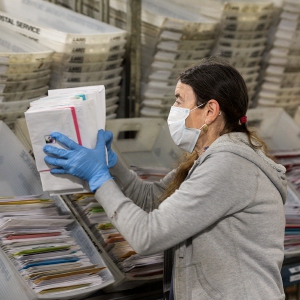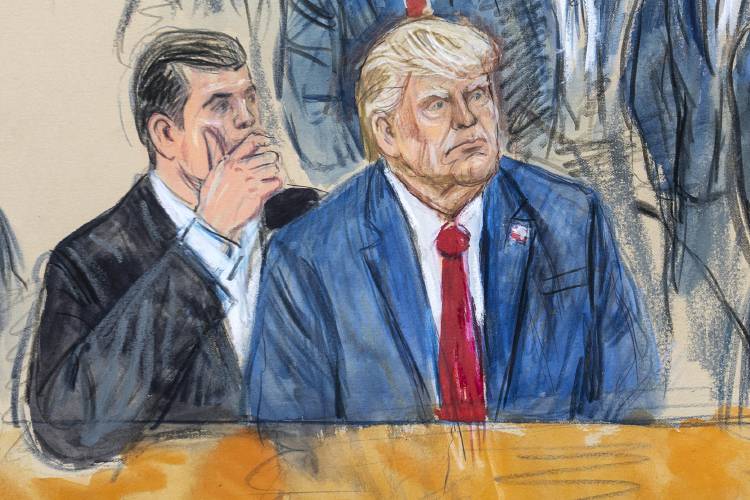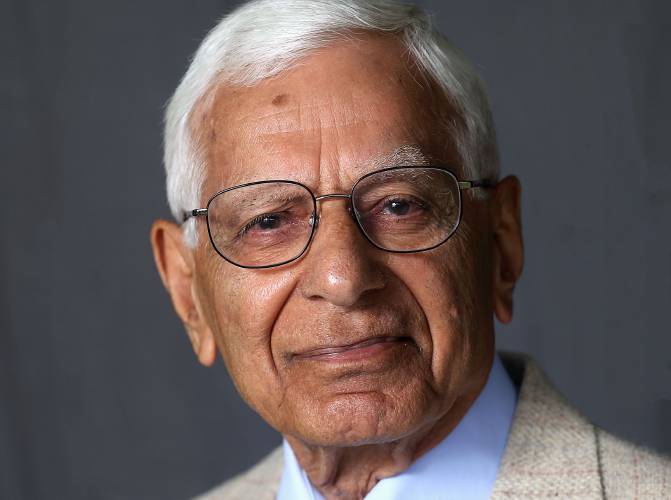Column: If I were a juror in the Trump election case
| Published: 08-14-2023 9:37 AM |
I would have to reprogram my mind and clear my conscience and try my best to become an impartial juror because the Sixth Amendment commands that the accused, Donald J. Trump, “shall enjoy the right to a speedy and public trial, by an impartial jury.” Jury duty is one of the most sacred obligations of being a citizen.
Can I really become an impartial juror in spite of the fact that since the November 2020 presidential election results, I have been exposed to the most horrendous, though spectacular, images of the Capitol being assaulted by a murderous mob and senators and House members running helter-skelter for safety; watched the House Select Committee to Investigate the January 6th Attack live proceedings and read the executive summary report, which concluded that none of the events of Jan. 6, 2021, would have happened without Trump?
And then there’s the Trump tweet: “Be there, will be wild!”
Based on special counsel Jack Smith’s investigation and the grand jury indictment, Trump has been charged with “conspiracy to defraud the United States; conspiracy to obstruct an official proceeding; obstruction of and attempt to obstruct an official proceeding; and conspiracy against rights.” Calling the Jan. 6 insurgency an “unprecedented assault on the seat of democracy,” Jack Smith said that “it was fueled by lies: Lies by the defendant targeted at obstructing a bedrock function of the U.S. government — the nation’s process of collecting, counting and certifying the results of the presidential election.”
I should forget that the First Amendment protects lies also.
Jack Smith’s persuasive and passionate arguments about Trump’s crimes against the nation; and the media’s overwhelming view that Trump’s popularity among Republicans and his high poll numbers not only versus Republicans but also against President Joe Biden pose a serious threat to democracy — all this and more would also pose a big challenge for me as a juror. I’m expected, as a juror in the case, to remain uninfluenced, untainted and impartial. To be a juror is a great moral responsibility, isn’t it?
During the jury admonishment, Judge Tanya Chutkan trying the Jan. 6 criminal case against Trump would, I hope, remind the jurors of the Democratic-leaning District of Columbia not only about the law under which the former president is being tried but also about other cardinal principles of the American judicial system.
For example, the American judicial system assumes that a person is innocent until proven guilty. This judicial right of presumed innocence comes from the Fifth Amendment of the U.S. Constitution which guarantees citizens that no one shall be “deprived of life, property or liberty without following the due process of law.” “The due process” is the foundation of liberties in America. It must be kept in my mind that judicial procedures are sacrosanct, and any violation might lead to a mistrial.
Article continues after...
Yesterday's Most Read Articles
 Homeless Upper Valley couple faces ‘a very tough situation’
Homeless Upper Valley couple faces ‘a very tough situation’
 Lebanon’s Jewell back from auto accident, more aware of ‘drowsy driving’ dangers
Lebanon’s Jewell back from auto accident, more aware of ‘drowsy driving’ dangers
 Plan on track to ship Upper Valley mail to Connecticut for sorting
Plan on track to ship Upper Valley mail to Connecticut for sorting
 West Lebanon crash
West Lebanon crash
 Crane crash on Interstate 89
Crane crash on Interstate 89
Therefore, Donald Trump shall remain innocent until the prosecution proves beyond a reasonable doubt — one might say, 99% absolute proof — that he committed the crimes. Nonetheless, let’s keep in mind that the benefit of the doubt goes to the accused.
Since it is a question of Donald Trump’s life and liberty, the jury must give a unanimous verdict. All that Trump’s defense team needs is only one doubting Thomas among the 12 jurors. If doubtful, let it go; and that is what the 18th-century British jurist William Blackstone said: “The law holds that it is better that 10 guilty persons escape, than that 1 innocent suffer.” American jurisprudence owes much to Blackstone’s commentaries.
Remember O.J. Simpson? A former football running back said to be one of the greatest, and a movie actor (“Roots,” “The Naked Gun”), and much more. Once a national celebrity, Simpson’s professional success was marred by the murders of his former wife Nicole Brown, and her friend Ron Goldman in 1994. The media and the public were convinced that Simpson was the killer, yet he was acquitted on the benefit of the doubt. During the trial when the bloody gloves that he was supposed to have worn while committing the murders did not fit, his attorney Johnnie Cochran told the jury, “If it doesn’t fit, you must acquit.” And Simpson was acquitted, on the benefit of the doubt. As they say, judges and juries are unpredictable.
That’s why I as a juror would keep my mind open to see whether the prosecution or the defense springs up a surprise, an illuminating judicial moment, a turn of phrase that would convince the jury of whether Trump committed the crimes against the nation or was simply conducting a political theater that went out of control. Just consider Trump’s runaway utterance after his indictment: “If you go after me, I’m coming after you!”
As an impartial juror, I would still keep my mind open, nonetheless, wondering whether we are trying a political criminal, a cult leader with millions of absolutely committed diehard MAGA followers, or a political phenomenon. Can our judicial system try a political phenomenon?
“Trump is a monster ... and deserves to go to prison,” wrote The New York Times’ David Brooks. But what depth of the collective consciousness of American society has Donald Trump emerged from? As Walt Kelly’s Pogo said, “We Have Met the Enemy and He Is Us.”
Narain Batra, a student and scholar of the First Amendment, taught media law and ethics for more than three decades. In early November, under the auspices of the Dartmouth Osher Institute, he is set to give a lecture: “Our Freedoms and the Age of Artificial Intelligence.”



 Editorial: Hartford is right to give banners due consideration
Editorial: Hartford is right to give banners due consideration Editorial: Response to campus protests only adds fuel to the fire
Editorial: Response to campus protests only adds fuel to the fire Editorial: Chris Sununu’s moral vacuum
Editorial: Chris Sununu’s moral vacuum Editorial: Gambling tarnishes America’s sporting life
Editorial: Gambling tarnishes America’s sporting life
